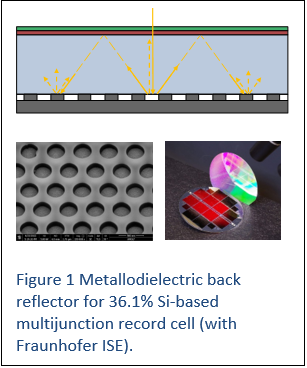PhD position: Optimizing light management in perovskite tandem solar cells
Work Activities
In this project you will contribute to realization of solar cells with a photovoltaic power conversion efficiency that can ultimately exceed 40%. It is focused on tandem solar cells, which are composed of two semiconductors that are stacked on top of each other, in which the top cell catches the blue/green part of the solar spectrum and the bottom cell the red/infrared part. We make use of an exciting new class of semiconductors, halide perovskites, that can be deposited as ultrathin films. In this way a high-efficiency perovskite/silicon tandem solar cell can be made.
In these tandem solar cells the surface of the silicon bottom cell is usually covered with macroscopic surface texture, in order to create efficient light trapping. However, the integration with a perovskite top cell is not always compatible with macroscopic surface features. In this project we will design and optimize metallo-dielectric back reflector geometries that scatter and redirect light in specially tailored ways, in order to replace the surface texture on the Si cell, so that the perovskite-silicon interface can remain flat, potentially enhancing the cell efficiency.
In parallel, you will investigate specially tailored microstructures on the surface of the solar cell that preferentially scatter (far-)infrared spectral bands. This can create effective passive radiative cooling which reduces the temperature of the solar cell under solar irradiation. This enhances the efficiency and stability of the solar cell. We aim to apply optimized microdesigns tailored to the solar cell geometries studied in the SolarNL program, in particular the lightweight polymer-laminated Si solar cell panels, polymer-laminated perovskite foils and glass- or polymer-coated silicon-perovskite tandem solar cells.

|
The project is part of a large national initiative, SolarNL, aimed at supporting the Dutch solar photovoltaic industry. For more information, visit SolarNL.eu. SolarNL is a consortium comprising several companies, the Dutch government, and both applied and fundamental research institutions. This collaborative effort focuses on developing an industry capable of producing solar cells, solar modules, and integrated solar PV solutions. You will join 40 other PhD students from across the Netherlands to tackle fundamental research challenges that underpin these industrial activities. This team of PhD students will participate in workshops together and closely collaborate with industrial and applied research partners to ensure that research outcomes are swiftly implemented in the solar PV industry. |
Qualifications
We invite applications from highly motivated candidates with a strong background in physics, chemistry, materials science, or engineering, and a keen interest in solar cells. We especially encourage individuals from underrepresented groups to apply. Prospective PhD candidates must hold an MSc degree in physics or equivalent qualification.
Work environment
The Photonic Materials group (www.erbium.nl), led by Prof. Albert Polman, studies light-matter interactions at the nanoscale. The group is composed of an international team of 8-10 PhD students, postdocs and master students that work in a collaborative atmosphere with many social group activities. Every week we hold group meeting, PV team meeting, and departmental colloquium and poster sessions, in addition to regular journal clubs. We also regularly organize an international group labtour. Our group is part of AMOLFs Light Management in Photovoltaic Materials Program that is composed of 5 research groups (50 PhD students and postdocs) that share a state-of-the-art cleanroom for nanofabrication and characterization and many other facilities.
We offer a highly collaborative and supportive environment, fostering strong connections both within the group and with our national and international partners. PhD students benefit from a variety of courses designed to enhance their research skills.
AMOLF is a part of NWO-I and initiate and performs leading fundamental research on the physics of complex forms of matter, and to create new functional materials, in partnership with academia and industry. The institute is located at Amsterdam Science Park and currently employs about 140 researchers and 80 support employees. www.amolf.nl
Working conditions
- The position is intended as full-time (40 hours / week, 12 months / year) appointment in the service of the Netherlands Foundation of Scientific Research Institutes (NWO-I) for the duration of four years
- The starting salary is 2.781 Euro’s gross per month and a range of employment benefits
- After successful completion of the PhD research a PhD degree will be granted at a Dutch University
- Several courses are offered, specially developed for PhD-students
- AMOLF assists any new foreign PhD-student with housing and visa applications and compensates their transport costs and furnishing expenses
More information?
For further information about the position, please contact Albert Polman: a.polman@amolf.nl
Application
You can respond to this vacancy online via the button below.
Online screening may be part of the selection.
Diversity code
AMOLF is highly committed to an inclusive and diverse work environment: we want to develop talent and creativity by bringing together people from different backgrounds and cultures. We recruit and select on the basis of competencies and talents. We strongly encourage anyone with the right qualifications to apply for the vacancy, regardless of age, gender, origin, sexual orientation or physical ability.
AMOLF has won the NNV Diversity Award 2022, which is awarded every two years by the Netherlands Physical Society for demonstrating the most successful implementation of equality, diversity and inclusion (EDI).
Commercial activities in response to this ad are not appreciated.


